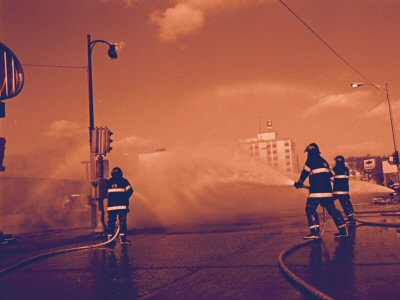Two people were sitting in a bare, concrete room, deep in the heart of a maximum-security prison. Both were seated on ordinary wooden chairs, and both were facing the other – but one was a prisoner and the other was free. Surrounding them were eight armed guards, ready to move at the least sign of trouble – but there would be no trouble. Both of the men knew that.
They had known each other for a long time, for they grew up together. Both dreamed of accomplishing great things with their lives, and both tried to achieve their goals – but they went about it differently. As time went on their relationship changed, and the day came when one of these men spent the better part of his life searching for the other. At times it looked as if he was doomed to fail, but he never despaired of catching him, and one day he finally did.
The man had built his career hunting down people like the one sitting in front of him. His success in tracking down these troublesome rebels had enabled him to rise quickly through the ranks of power until he had reached the top position in the empire. No one held more power in the galaxy than he did, for he was the supreme leader. His whims were absolute law in more than a million star systems. He bowed to no one, and his will was enforced not by men but by an army of untiring intelligent machines, programmed to do his bidding alone.
In the old days – the days before true artificial intelligence was developed and coupled with nanobot replication – it was possible to avoid detection and remain a subversive for decades. There were so many places to hide in the galaxy that was filled with obscure corners, dark asteroids, and secret bases floating in the darkness of space. All that had changed, though, when intelligent machines were invented. Within a generation these devices had reproduced and could be found in every corner of the galaxy, lurking, watching, waiting. Nothing passed under their gaze or avoided their notice, and there could be no possibility of hiding. The network of machines was always expanding; it was already stretching into intergalactic space and soon it would reach even farther than that. Nothing could hide. The person that controlled this network of androids controlled the events on every planet in the galaxy – and that person was Dr. Neil Foster, Director of Services.
Obscure titles pleased Dr. Foster greatly. He had been the one who sabotaged the AI network and turned it from a race of servant machines to a race of masters. When he was young he had been placed over the AI network with the charge of finding better ways of using it. In those days the AI network was in shambles and the department was a mess, making it a useless tool in tracking down subversives. Dr. Foster rebuilt the entire department, and when he did so he personally made some subtle changes to the code that ran inside the androids. On the surface they appeared to be unchanged, but when the signal was sent out they would change into an army loyal to him and him alone. Only an examination of the code that ran the androids would reveal this treachery, and the only person who had access to the critical code was Dr. Foster – the very man who had altered it.
It was easy for him to gain control once his network was in place. What was not so easy was hunting down every last subversive. Religious fanatics were hard to track down, as they had an amazing ability to elude detection and could live in the most out-of-the-way places. Slowly but surely, though, Dr. Foster had tracked them all down. The last one to go was their unofficial leader, a man known only as Mishael. This was the man who was sitting across from Dr. Foster – the man who had eluded him for so long. Now, at last, the chase was over: the last rebel had been captured, and there would be no escaping the iron grip of Dr. Foster’s electronic servants.
“So you are defeated at last, Mishael,” Dr. Foster began. “It took forty years, but you were finally caught and everything you have worked for has been destroyed. I have been complete and thorough: I have destroyed every book you have written, every person who knew you, and every colony you influenced. No one outside this room knows anything about you, and even if they did no one would care. Your name has been wiped clean; everything your hands has produced has been destroyed. No one you preached to is alive today. The last colony – the one you worked so hard to save – was found and vaporized. You alone are left, and you will soon join the dead.
“Why did you bother, Mishael? Why did you choose the hard road? Did I not tell you, when we were young, that you would gain nothing by it? I told you the way of power and you did not heed me. Why did you waste your life?”
Mishael looked at his opponent calmly. “Why did you waste yours, Neil? Did I not warn you what the end would be?”
Dr. Foster looked into his eyes. His friend had not changed a bit in all these years; he still could not see. So many people were blind, blind until the very end – nothing could make them understand. This made them entertaining, he though, but sad all the same.
“Yes, Mishael, look at what I have achieved! I sought complete power, and I got it. My word – mine! – means sweet life or bitter death. All the riches in the galaxy are mine. All the races are slaves to my will. I am the one who decides who is healed and who dies; I decide who is set free and who is enslaved. Nothing happens apart from my will. I have gained all there is to gain. You, on the other hand, have lost everything, and you are complete denial. You have no idea what is happening and I don’t think you will ever understand.”
Mishael shook his head. “No, Neil, it is you who does not understand. You wanted power, riches, and fame; that is all you wanted, and that is what has been given to you – and you paid a terrible price for it. What I wanted was something different, and that is what you cannot understand.
“You have never understood those who have given their lives to Christ. We are not living for ourselves anymore: we passionately seek the will of our Father. I want to see all power, majesty, and glory given to Christ, the One who died for me. My life is His, to do with as He pleases. The purpose of my life has not been to please myself but to please my Father. I am living for Him, and that is what you cannot understand. I don’t care about possessions. I don’t care who knows my name. I don’t care how many people are under my authority. All I care about is pleasing Jesus, and loving Him with all my very soul.”
“And what has it gotten you?” Dr. Foster snapped. “Your life is forfeit. Everyone you know – all your friends, who followed this path with you – are dead. Nothing you have made remains. You wanted so much to explore the stars, and instead you spent your life on the run, trying to infect other people with this belief of yours. You never achieved anything. You wasted your entire life, and now your life is over, and you can’t even see what you’ve done.”
“In your way of thinking,” Mishael responded, “I have. But I see the world differently than you do, Neil. You don’t believe in God at all; I do. I believe that God has a claim against the human race: we have sinned against Him and great wrath is stored up against us. I believe that Christ came and died for me to take the punishment I deserved; when I believed on Him I was saved.
“You, Neil, do not believe in sin at all. Since you think there is no God, you don’t see how anything can be right or wrong – the terms are meaningless to you. Christ’s death is pointless to you because you believe there is nothing you need forgiveness for. You don’t see that you have broken the laws of God and are facing a terrible judgment.
“I was a slave – unable to stop sinning, unable to cover my debt with God, dying and without hope. I knew I would face His just wrath when I died; I was lost without a hope. Then I found that Jesus had died to save me: He had taken the punishment I should have suffered and all I had to do to be saved was believe – that He was God and Man, that He had taken my punishment, that He had died and rose again, and that by believing in what He did I could be free. By His grace I repented of my sins; I begged His forgiveness and asked Him to enter my life and make me His – and He did, and I was saved. It was not what I did but what He did.
“This, Neil, is why we are so different. I see things as they really are. You see life as a mad rush to fulfill your every desire and wish; I see life as an opportunity to please Christ and show Him how much I love Him. You see death as the end; I see that I am an immortal who will live forever. You see this Universe as being the sum total of creation; I see this Universe as being a temporary thing that will soon pass away, and that on the other side of the grave is the real world – the place where I will live forever with the one who died to save me.
“You see my life as futile, for in your eyes I have amassed nothing. I see my life as a blazing success: I have preached where Christ asked me to preach, I have been used by Him to save souls from death, and I have been used by Him for His glory. I am incredibly blessed! The only things I have lost are things that don’t really matter. Why should I care if I have no possessions? All my possessions are eternal, and they are in my home with my Father: they are safe there.
“Soon, Neil, I will be with my Savior, where I will live forever. I will have a new body – a better one. I will be in a place where there is no pain, no suffering, no death. I will be free from sin at last – free, gloriously free, to do the will of my Father. Evil will be defeated and I will have all of eternity to live. I may yet explore the handiwork of my Savior – with Him as my guide.
“But look at you, Neil! You have gained all that there is to gain, in your sight, but all you have done is amassed a fortune that you will soon lose. Nothing here is permanent; it will one day be destroyed, if not soon then when the Universe is brought to an end. You will soon die, Neil, and when you do you will face the wrath of an angry God – a God whose children you have tortured and executed without mercy. What will you do when you have to face Him and He wants to know what you have to say about how you treated His children? Do you have any idea what the wrath of an infinite God is like? You have refused His love and spat on the sacrifice of His son; there is nothing left but wrath. You jest now, but you will not be jesting when the Lord stands before you accusing you, and by His side are the many you have murdered.
“You have sought treasure, and you got it, but it will do you no good on that day. You have sought fame, and you got it, but fame will get you nowhere when you are judged. You couldn’t be bothered with God, and you will soon discover that there is a price to be paid for that – a terrible price. All your arguments and folly will vanish on that day.
“You are the blind one: you cannot see the Universe for what it really is. Christ is foolishness to you; the very idea that there is a God makes you laugh. You will not be laughing when you meet him, Neil: you will bitterly regret what you have done, but it will be too late to change. You have been blinded by things that do not matter; you have spent your life gathering shadows that will soon vanish, and you have ignored the treasure that will last forever.
“You had a chance, Neil. You could have had treasure, but instead of seeking heavenly treasure you despised it and sought for silver and gold instead. You could have had joy, but you detested Christ – the source of joy – and sought instead to do whatever your body craved. You could have had fame, and an enduring name in Heaven, but you despised the praise of God and sought the praise of men. You could have had life everlasting, but instead you rejected the one Man who came to give you life and you embraced death.
“You claim to have power, but you don’t have power at all. God is in control, not you: you can do nothing at all except what God allows. God has placed you where you are and God can remove you just as easily. I am not in your hands, but His; when He is done with me He will bring me home and not all your power and might can put me to death a minute sooner than He chooses. You say that you rule the stars, but He created them – and when He is finished with them He will bring them to an end. You talk about ruling the stars: with God it was an effortless act to halt the Sun in the sky so that Joshua could avenge himself upon his foes, and not all your power and might can make the Sun rise and fall at your will.”
Two men – sitting across from each other. One man was a free man; the other was a slave. One man would live, and the other would die. One was the victor, and the other had lost. Soon they would both know who was the victor and who was not – very soon.





